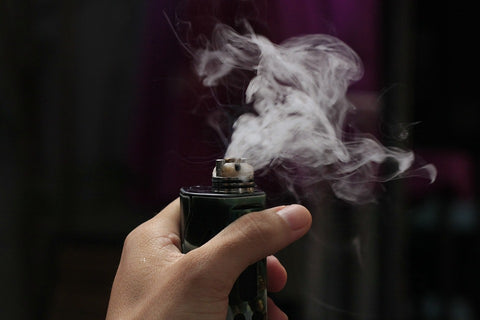Yo Yo Yo! What is going on? How are you guys on this Thursday?
Another good read coming to you from our online vape magazine
https://breazy.com/blogs/updates/florida-wants-to-add-vaping-to-indoor-smoking-ban

Lawmakers in Florida are in the process of amending their indoor smoking ban to include vapor products. The ban on tobacco smoke was originally implemented 16 years ago, and this week a proposal to add vaping onto the ban passed through an important state panel. A final vote needs to come before May for the amendment to be on the ballot for midterm state elections.
The amendment passed through the Florida Constitution Revision Commission in a decisive 26-6 vote, according to local station News 4 Jax. The 37-member committee only gets together once every twenty years to agree to make changes to the state’s constitution. State Senator Lisa Carlton is the main backer of the proposal, though her arguments center around an already-debunked and bogus claim that Floridians are subjected to so-called harmful “second-hand” or “passive” vaping.
“Add e-cigarettes and vaping into the Constitution so that our citizens can stop being experiments. Because that’s what we’ve been … as those of us who don’t vape have been an experiment for all of the citizens that are vaping,” Carlton said. “I think it’s time to clean up our restaurants, our malls, our movie theaters, so we can all breathe clean air again, which is what the 2002 constitutional amendment intended.”
Carlton pointed to the 2016 surgeon general’s report which stated that secondhand aerosol exhaled into the air from vape devices can expose others to potentially harmful chemicals, however, that report has been largely discredited with various studies done on the effects of exposure to passive vaping.
First, a study performed by Igor Burstyn at Drexel University analyzed over 9,000 observations on e-cig vapor and concluded that "there is no evidence to suggest vaping produces inhalable contaminants that would warrant health concerns." Second, the California Department of Public Health conducted a comprehensive study showing that secondhand vapor is safe, despite making an extensive effort to find some sort of toxin. Third, a review conducted by the Royal College of Physicians and Public Health England, Nicotine Without Smoke, dismissed harm connected to secondhand vapor.
"There is, so far, no direct evidence that passive exposure is likely to cause harm…[while bystanders may be] exposed to passive nicotine..there is no plausible mechanism by which such deposits could enter the body at doses that would cause physical harm," says the Royal College of Physicians and Public Health England.
In the results of the experiment, the researchers found that e-cig exhalation contained eight times less nicotine than cigarette exhalation.
Comments by former Florida State Senator Carlton pointed to a more personal bias against vaping than a readily researched scientific argument. She offered the example of watching her gymnast daughter work out at a gym and sitting behind someone who was vaping.
“It infuriated me that I was sitting in a health facility in a closed workplace watching activities of children and there was somebody in front of me vaping,” she said. “And I can go on and on, but I won’t.”
Florida’s process of adding vaping to an already existing indoor smoking ban is a clear instance where personal bias, misinformation and misperceived danger influences legislation far more than up-to-date scientific data. Other states, like Montana, have offered similar indoor bans but managed to treat vaping differently and apart from smoking bans. Our hope: a common-sense middle ground can be located, where vapers are courteous enough not to annoy others with their clouds but still aren't ostracized in the same fashion as smokers are today.
~Thanks for reading!!
https://breazy.com/blogs/updates/florida-wants-to-add-vaping-to-indoor-smoking-ban
Another good read coming to you from our online vape magazine
https://breazy.com/blogs/updates/florida-wants-to-add-vaping-to-indoor-smoking-ban

Lawmakers in Florida are in the process of amending their indoor smoking ban to include vapor products. The ban on tobacco smoke was originally implemented 16 years ago, and this week a proposal to add vaping onto the ban passed through an important state panel. A final vote needs to come before May for the amendment to be on the ballot for midterm state elections.
The amendment passed through the Florida Constitution Revision Commission in a decisive 26-6 vote, according to local station News 4 Jax. The 37-member committee only gets together once every twenty years to agree to make changes to the state’s constitution. State Senator Lisa Carlton is the main backer of the proposal, though her arguments center around an already-debunked and bogus claim that Floridians are subjected to so-called harmful “second-hand” or “passive” vaping.
“Add e-cigarettes and vaping into the Constitution so that our citizens can stop being experiments. Because that’s what we’ve been … as those of us who don’t vape have been an experiment for all of the citizens that are vaping,” Carlton said. “I think it’s time to clean up our restaurants, our malls, our movie theaters, so we can all breathe clean air again, which is what the 2002 constitutional amendment intended.”
Carlton pointed to the 2016 surgeon general’s report which stated that secondhand aerosol exhaled into the air from vape devices can expose others to potentially harmful chemicals, however, that report has been largely discredited with various studies done on the effects of exposure to passive vaping.
First, a study performed by Igor Burstyn at Drexel University analyzed over 9,000 observations on e-cig vapor and concluded that "there is no evidence to suggest vaping produces inhalable contaminants that would warrant health concerns." Second, the California Department of Public Health conducted a comprehensive study showing that secondhand vapor is safe, despite making an extensive effort to find some sort of toxin. Third, a review conducted by the Royal College of Physicians and Public Health England, Nicotine Without Smoke, dismissed harm connected to secondhand vapor.
"There is, so far, no direct evidence that passive exposure is likely to cause harm…[while bystanders may be] exposed to passive nicotine..there is no plausible mechanism by which such deposits could enter the body at doses that would cause physical harm," says the Royal College of Physicians and Public Health England.
In the results of the experiment, the researchers found that e-cig exhalation contained eight times less nicotine than cigarette exhalation.
Comments by former Florida State Senator Carlton pointed to a more personal bias against vaping than a readily researched scientific argument. She offered the example of watching her gymnast daughter work out at a gym and sitting behind someone who was vaping.
“It infuriated me that I was sitting in a health facility in a closed workplace watching activities of children and there was somebody in front of me vaping,” she said. “And I can go on and on, but I won’t.”
Florida’s process of adding vaping to an already existing indoor smoking ban is a clear instance where personal bias, misinformation and misperceived danger influences legislation far more than up-to-date scientific data. Other states, like Montana, have offered similar indoor bans but managed to treat vaping differently and apart from smoking bans. Our hope: a common-sense middle ground can be located, where vapers are courteous enough not to annoy others with their clouds but still aren't ostracized in the same fashion as smokers are today.
~Thanks for reading!!
https://breazy.com/blogs/updates/florida-wants-to-add-vaping-to-indoor-smoking-ban
Last edited:



